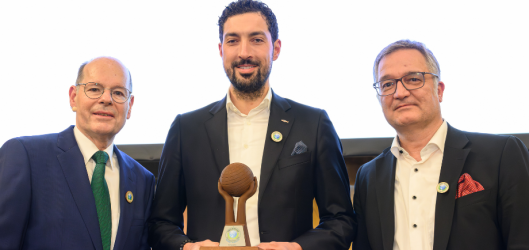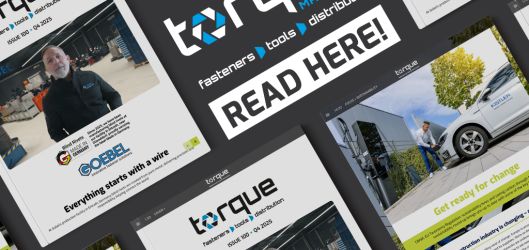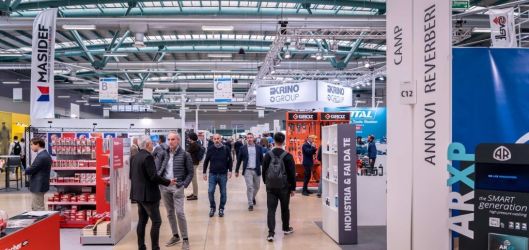
Dr Julia Pickelmann discusses her day-to-day role within fischer’s Chemical Development department and suggests how companies can support their female employees’ careers both within, and outside of, the workplace.
How did you come to work in the industry?
Ever since I first started my chemistry degree I always wanted to work in something application‐related, where you can immediately test things and see what you’ve developed. There was a construction chemistry degree course at my place of study, the Technical University of Munich. Various construction chemistry lectures were offered during my Master’s degree course and doctoral theses, and the first job I applied for was therefore in that field and I ended up working for fischer.
What type of work does your department do?
The chemical development laboratory where I work has a diverse range of tasks, such as supporting the production department, for instance. This involves the quality control of raw materials supplied as well as the continuous monitoring of ongoing production. We also support our colleagues in quality management by analysing customer returns in order to better understand what went wrong or whether there has been an application error.
Furthermore, we provide advice on application engineering queries or carry out additional tests for specifications that deviate from our products’ usual field of application. However, the majority of our work involves development. This includes the optimisation and development of products which requires having an overview of the market and the current state of technology. We also take a close look at competitors’ products; testing and analysing them in order to compare them to our own products. Patent research is equally important in order to protect our own ideas on the one hand and to avoid infringing upon existing property rights on the other.
It is also important to be familiar with the raw material market when it comes to new developments in order to be able to estimate availability and the price of raw materials. This ensures that we don’t develop a product which ends up being too expensive.
What does your daily work involve?
I’m involved in all of my department’s activities, which makes working in this area so varied. The thing that makes our development department so special and interesting is that we are involved in the product’s development from start to finish. This starts with an idea at a desk and goes on to tests in a laboratory until the initial product tests.
Carrying out lots of tests in the laboratory is particularly important, especially at the start of developing something new as it allows you to get a sense of the resulting product. Various formulas are mixed, for instance, before being evaluated according to various criteria. Planning the tests is very important and gores towards ensuring we save resources, work efficiently and reach our objective as soon as possible. My job also involves plenty of data analysis. This includes evaluating analytical measurement methods a well as mechanical values.
What is the best thing about working in the industry?
I still enjoy being up close to the application. I find it fascinating to see where and how the products end up being used which we were only recently developing and testing in the laboratory. It’s also interesting to see the varying construction methods in different countries as well as their preference for certain products. I am fascinated by the diversity of the industry – construction is everywhere, yet it is done differently everywhere you go.
Can you describe any particular career highlights or milestones you have experienced?
Suggestions for improvements within our fischer Group of Companies are submitted every year as part of the fischer ProcessSystem (fPS), which serves the purpose of optimising company processes. The 10 best submissions are presented during a large‐scale event and are evaluated by a top‐class jury from the fields of industry and research before being presented with awards in categories including savings, fast implementation, sustainability and digitalisation.
The Japanese firm KSK is also involved, with whom fischer has had a strong partnership for many years. Fischer has been able to learn a lot from KSK when it comes to the Kaizen philosophy. Winning this year’s fPS award is therefore definitely a milestone, as is the associated trip to Japan, during which there will of course be a visit to our partner firm KSK.
Do you have any advice for women who are considering entering the industry?
Don’t hesitate, just go for it. If you are enthusiastic and curious about the industry then almost everything else will fall into place.
What would you say to women who may be put off by the industry’s male-dominated culture perception?
Definitely don’t let yourself be put off! Of course, you stand out more to begin with as a woman in a group of men, but in the long term it is your performance which is of primary importance. I haven’t had any negative experiences in this regard thus far. As a woman you have a different approach to certain situations or problems, which can be very helpful and is often appreciated by your colleagues. In this sense, the growing number of women joining the industry is an asset, even though the overwhelming majority in the field are still male.
In your opinion, what could be done to support women in the industry?
In my opinion I don’t think it should be about supporting women in this industry in particular, but about providing better support to women in general, especially when it comes to career and families. This is where the biggest differences can still be seen between women and their male colleagues.
Despite the fact that there has been a lot of progress in Germany in recent years, such as shared parental leave, women are still primarily responsible for childcare. They therefore have to take longer breaks in their career and can often only work part‐time once they return to work. I am fortunate that fischer and my line manager support colleagues with children, enabling flexible working hours and remote working. This makes it easier to return to work quickly and to combine children and a career. If we want to attract more women to companies then we need flexible working hours, in‐house nurseries and other strategies that don’t force us to choose between a career and a family.
Final thoughts?
Ultimately, it doesn’t matter whether industries are dominated by men or women. There will always be professions that appeal more to women or men, but it is important to be open and unbiased towards ‘minorities’ and to give everyone the same opportunities. The only thing that matters, in the end, is the person’s performance, regardless of whether they’re male or female.



